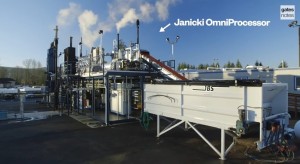
The OmniProcessor is the ultimate example of that old expression: one man’s trash is another man’s treasure.
Image: YouTube/Gates Notes
The Bill & Melinda Gates Foundation is working to turn poop into drinking water with this ingenious new machine.
As part of their effort to improve sanitation in poor countries, the Gates Foundation has helped give flight to an OmniProcessor that burns human waste to produce water and electricity.
How does it work? Check out the video to see the process.
But here’s the big question – why do we need to turn waste into drinking water and electricity?
This from Gates Notes:
Because a shocking number of people, at least 2 billion, use latrines that aren’t properly drained. Others simply defecate out in the open. The waste contaminates drinking water for millions of people, with horrific consequences: Diseases caused by poor sanitation kill some 700,000 children every year, and they prevent many more from fully developing mentally and physically.
The undeniable truth is that in order to improve sanitation in developing countries, we need to develop innovative solutions.
“The sanitation system as we know it in the developed world cannot work in developing countries. What we need in developing countries is a very simple system.”
That is why work such as this and our partnership with the Bill & Melinda Gates Foundation is so important – and potentially, life-changing.
Gates states that the next-generation of the self-sustaining OmniProcessor will be able to handle waste from 100,000 people, producing up to 86,000 liters of potable water a day and net 250 kw of electricity.
This innovation can do more than aid in solving a global crisis – it may also turn waste into a commodity.

